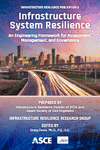Chapter 4
Assessment, Management, and Governance
Publication: Infrastructure System Resilience: An Engineering Framework for Assessment, Management, and Governance
Abstract
The processes in the infrastructure resilience framework are distinguished as system assessment processes, management processes, and governance processes. The management and governance activities draw on inputs from the assessment phase and are tightly linked. The three types of processes focus on infrastructure system resilience, which is closely linked with community resilience. In this chapter, the processes are reviewed and connected to community resilience. Assessment in the context of this framework refers to the wide variety of methods or tools the various infrastructure systems may have to assess and evaluate the performance of their systems to potential or actual hazard strikes in support of the communities they serve. In the context of the framework, management is the process dealing with and controlling the infrastructure systems financing, planning, design, construction, operations, and maintenance and the people and groups necessary to undertake these roles.
Get full access to this article
View all available purchase options and get full access to this chapter.
References
Aoki, M. 2001. Toward a comparative institutional analysis. Cambridge, MA: MIT Press.
Cimellaro, G. P., A. M. Reinhorn, and M. Bruneau. 2010. “Seismic resilience of a hospital system.” Struct. Infrastruct. Eng. 6 (1–2): 127–144.
Cutter, S. L., L. Barnes, M. Berry, C. Burton, et al. 2008. “A place-based model for understanding community resilience to natural disasters.” Global Environ. Change 18 (4): 598–606.
Davis, C. A. 2019. “A proposed performance based seismic design process for lifeline systems.” In Earthquake geotechnical engineering for protection and development of environment and constructions, 1986–1993. Boca Raton, FL: CRC Press.
Davis, C. A. 2021. “Understanding functionality and operability for infrastructure system resilience.” Nat. Hazard. Rev. 22 (1): 06020005-1–6.
Davis, C., B. Ayyub, S. McNeil, K. Kobayashi, et al. 2022. “Infrastructure resilience: A framework for assessment, governance and management.” In Proc., 4th Global Summit of Research Institutes for Disaster Risk Reduction, Increasing the Effectiveness and Relevance of Our Institutes, 127–155. Singapore: Springer. Accessed March 19, 2023. https://www.springerprofessional.de/en/proceedings-of-the-4th-global-summit-of-research-institutes-for-/23775482.
Davis, C. A., A. Mostafavi, and H. Wang. 2018. “Establishing characteristics to operationalize resilience for lifeline systems.” Nat. Hazard. Rev. 19 (4): 04018014-1-21.
Deierlein, G. G., F. McKenna, A. Zsarnóczay, T. Kijewski-Correa, et al. 2020. “A cloud-enabled application framework for simulating regional-scale impacts of natural hazards on the built environment.” Front. Built Environ. 6 (2020), 1-18.
FEMA (Federal Emergency Management Agency). 2023. A framework to establish lifeline infrastructure system service recovery objectives for seismic resilience. FEMA P-2234. Prepared by Applied Technology Council. Washington, DC: FEMA.
Folke, C., R. Biggs, A. V. Norström, B. Reyers, et al. 2016. “Social–ecological resilience and biosphere-based sustainability science.” Ecol. Soc. 21 (3): 41.
Kusel, J., and L. P. Fortmann. 1991. “What is community well-being?” In Vol. 1 of Well-being in forest-dependent communities, edited by J. Kusel and L. Fortman, 1–45. Berkeley, CA: Forest and Rangeland Resources Assessment Program and California Dept. of Forestry and Fire Protection.
May, P., and C. Koski. 2013. “Addressing public risks: extreme events and critical infrastructures.” Rev. Policy Res. Policy Stud. Organ. 30 (2): 139–159.
NASEM (National Academies of Sciences, Engineering, and Medicine). 2019. Building and measuring community resilience: Actions for communities and the Gulf Research Program. Washington, DC: National Academies Press.
NIST (National Institute of Standards and Technology). 2015. Community resilience planning guide for buildings and infrastructure systems. NIST Special Publication 1190. Gaithersburg, MD: NIST.
North, D. 1990. Institutions, institutional change and economic performance. Cambridge, UK: Cambridge University Press.
Rockefeller Foundation and ARUP. 2014. “City resilience framework.” Accessed March 10, 2019. https://www.rockefellerfoundation.org/report/city-resilience-framework/.
Romero, N., T. D. O'Rourke, L. K. Nozick, and C. A. Davis. 2010. “Seismic hazards and water supply performance.” J. Earthquake Eng. 14 (7): 1022–1043.
Rose, A. 2016. “Benefit–cost analysis of economic resilience actions.” In Oxford research encyclopedia of natural hazard science. New York: Oxford University Press.
United Nations. 2016. “The infrastructure–inequality–resilience nexus.” In Global sustainability development report. New York: United Nations.
Van de Lindt, J. W., B. R. Ellingwood, H. Cutler, P. Gardoni, et al. 2019. “The structure of the interconnected networked community resilience modeling environment (IN-CORE).” In Proc., 2nd Int. Conf. on Natural Hazards and Infrastructure. Chania, Greece: National Technical Univ. of Athens [ISSN: 2623-4513].
Van der Merwe, S. E., R. Biggs, and R. Preiser. 2018. “A framework for conceptualizing and assessing the resilience of essential services produced by socio-technical systems.” Ecol. Soc. 23 (2): 12.
Information & Authors
Information
Published In
Infrastructure System Resilience: An Engineering Framework for Assessment, Management, and Governance
Pages: 43 - 49
Editor: Craig Davis, Ph.D., P.E., G.E.
ISBN (Online): 978-0-7844-8508-8
Copyright
© 2023 American Society of Civil Engineers.
History
Published online: Sep 25, 2023
ASCE Technical Topics:
- Business management
- Construction engineering
- Construction industry
- Construction management
- Disaster risk management
- Disasters and hazards
- Engineering fundamentals
- Financial management
- Financing
- Infrastructure
- Infrastructure construction
- Infrastructure resilience
- Practice and Profession
- Systems engineering
- Systems management
Authors
Metrics & Citations
Metrics
Citations
Download citation
If you have the appropriate software installed, you can download article citation data to the citation manager of your choice. Simply select your manager software from the list below and click Download.
